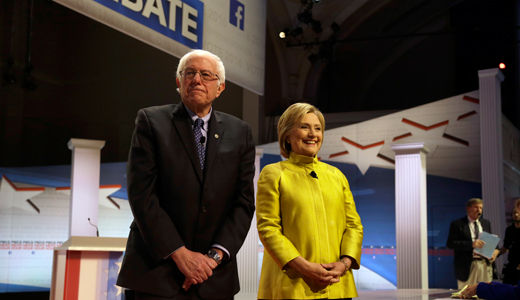
WASHINGTON – Faced with the threat of a neo-fascist capturing the White House, it’s my opinion that we progressives should work to ensure that the energy, direction and infrastructure being built by Bernie Sanders’ “political revolution” remain in the campaign against the right wing no matter who becomes the Democratic presidential standard-bearer.
Sanders himself says “Whether or not I win the nomination, we all must work together to unite the Democratic Party. We must come together to assure that the right wing does not capture the White House.
“The aim of the political revolution is to bring together Americans to demand that the government serve the people and not the billionaire class.”
At his victory rally in New Hampshire, the crowd did not yell slogans praising Sanders. They chanted, “This is what democracy looks like.”
The fact that Sanders chose not to launch the “revolution” as a protest movement but as a campaign within the Democratic Party cuts two ways. On the one hand, the movement has become part of the mainstream politics of America. That should say something to those on the left who so often argue that working within the confines of the Democratic Party amounts to nothing more than “selling out.”
On the other hand, on one level, the Sanders campaign resembles a round object trying to fit into a square hole. There is constant pressure on it to conform to the behavior of a regular political campaign – that is to treat what is happening as a horse race between two candidates. I think progressives should strive to keep the “revolution” in the “political revolution,” reminding people that we are involved in something much more than just “Bernie versus Hillary.”
The Republican presidential wannabees, right wingers all, are currently practicing what they preach: cutthroat competition. However, in all probability one candidate will emerge with a big-money-backed campaign. If it’s successful in winning the presidency, the nation would have no bulwark against policies and programs that could suck our economy dry, destroy our democracy, crush the gay rights movement, ruin our environment and curtail health care, especially for women.
If nothing changes, the right wing candidate is likely to be billionaire businessman Donald Trump, unless, of course, the so-called GOP “establishment” can unite behind one alternative to Trump.
Hillary is ahead in money, delegates
Meanwhile, the Democratic National Committee (DNC) seems determined to ensure that Hillary Clinton will be the Democratic Party nominee.
Unless this changes – and that does not seem likely – she will be.
Clinton began her campaign with more money in her coffers than any other candidate in either party. And to ensure money keeps flowing to back her, the DNC recently repealed the ban imposed by Barack Obama against campaign contributions from federal lobbyists.
Moreover, Clinton began her campaign with 362 super delegates committed to vote for her at the Democratic National Convention in July.
Super delegates are elected officials and others approved by the DNC who are allowed to support whichever candidate they like, regardless of the voting in primaries and caucuses. For example, even though Sanders won the New Hampshire primary by over 22 percent, Clinton walked away with nine of the 24 delegates allotted to the state: eight “super” and one elected.
Altogether, so far Clinton has a massive 394-44 delegate lead over Sanders.
There are a total of 4,763 delegates at the Democratic National Convention including 712 super delegates. Election outcome prognosticator Nate Silver calculates that even if Clinton wins only 42 percent of the votes in primaries and caucuses, she could win the nomination if the DNC convinces the super delegates to unite behind her.
On the other hand, although this is highly unlikely, the leadership of the DNC could decide to bring in a new candidate if they have evidence that neither Clinton nor Sanders could win in the general election. There have even been a few reports that Vice President Biden would “reconsider” his decision not to run.
Meanwhile, pushed by Sanders’ “political revolution,” the DNC and Clinton have begun to respond to pent up frustration that has been building up for years among the rank and file of the Democratic Party.
For example, at the end of the last televised Democratic debate, Clinton delivered a powerful closing statement calling for universal healthcare, expansion of Social Security benefits, reining in Wall Street, ending the exorbitantly high level of student debt, raising the minimum wage, protecting the right of women to make their own decisions about health care, and much more.
The DNC recognizes that in order to remain a vital force in America, the Democratic Party must be more aggressively progressive in advocating for working families.
The Trump threat
This will be especially true if Trump wins the Republican nomination. He is attracting thousands of mostly white workers, small businesspeople and their families.
Unions and union members are split about whether Sanders or Clinton can best beat Trump among workers and it looks now like the AFL-CIO will hold off next week at its execitive council meeting in San Diego from making an endorsement.
Trump accurately decries many of the problems facing the American people: job loss and lack of job security, low wages, expensive health care and the highest prices for prescription drugs in the world.
He even rails against politicians “who work for billionaires” and who refuse to take any action that will hurt their donors.
Service Employees International Union (SEIU) President Mary Kay Henry estimates that some 64 percent of SEIU’s public employee members identify as conservative and are drawn to Trump’s reassuring message: “I, through my will and skill, will take care of everything.”
At a rally in New Hampshire he told a cheering crowd, “I have lined up the richest, smartest people in the country … they’ll help me.
“You’ll be happy about everything.”
Henry, along with the leadership of many major unions, including the American Federation of Teachers and AFSCME is supporting Clinton, even though Sanders is at the forefront of SEIU’s national campaign to raise the minimum wage to $15 an hour. Unions already announced for Clinton represent more than half the workers in the AFL-CIO.
However, in New Hampshire union members overwhelmingly voted for Sanders. They, and an increasing number of union and non-union workers across the country, are heeding the call to “join the political revolution and tell the billionaires, ‘enough.'”
Several unions including the Communications Workers of America, National Nurses United, and the American Postal Workers Union have all endorsed Sanders.
Polls show that to attract workers, and more supporters in general, Clinton needs to sound more “aspirational.” For example, the public is aware of how difficult it will be to turn into realities the dreams of universal health care and expanded Social Security but voters want to be assured that their candidates are aiming high. Up until recently, Clinton was talking about incremental expansions of health care and Social Security as if they were ends in themselves.
She needs more often to call for fundamental improvements in American society, just as she did at the end of the last debate. And she needs to show she means it.
Helping Clinton’s agenda
Polls show that the majority of American voters will vote for Clinton for president, but not enthusiastically. She has “trustworthiness” problems that run deep and wide among voters. History has shown that even if polls favor candidates, without enthusiastic, dedicated campaign workers they could lose. Clinton has already been forced to shake up her campaign organization.
Progressives will have to support Clinton if she is the nominee despite misgivings because keeping the right wing out of the White House is job number one. However, our numbers are small. Winning in November might take a small army of enthusiastic campaign workers.
Supporters of Trump are nothing if not enthusiastic, and their numbers are growing.
Whether its leaders admit it or not, the Democratic Party needs the “political revolution” that Sanders is talking about to assure a win in November.
What’s more, if Clinton wins she will in all probability face at least a House and possibly a Senate too that is controlled by right wing Republicans. If she is serious about improving the lives of working people and the poor, she will need a broad-based, strong grassroots movement to back her up.
President Obama recognized the need for help from a grassroots movement to promote his agenda. He established Organizing for America. It dissipated rather quickly, though. While there is the hope that this will not happen to the political revolution being built by the Sanders campaign success will only follow a lot of hard work and struggle.
It’s much too early at this stage to expect Sanders supporters to make concrete plans to work for Clinton. On the ground, the Democratic nomination is still uncertain. Talking about a Sanders loss now would be discouraging to many of those building the political revolution, and they might just go home.
In order to assure that the thousands of people who are being inspired by Bernie Sanders today remain in the fight against the right tomorrow, progressives, moderates, Democratic party leaders and even Wall Street liberals who favor equality for all, should not belittle or berate the building of the “political revolution.”
Hopeful signs of unity
Until now, Clinton has been treating Sanders like she would any other opponent. For example, dragging him into an irrelevant argument to make political points: which of the two of them has been more loyal to President Obama. One of the high points in the early campaign was when Sanders dismissed the media’s focus on Clinton’s e-mails as distracting from real issues. We need a lot more of this from both of these candidates.
However, there are hopeful signs that Clinton and her supporters recognize the potential of the Sanders’ political revolution.
For example, Clinton has made clear that she wants people to vote for her because of her ideas and political goals, not because of her gender.
Most important, she praised Sanders for getting many discouraged voters energized and many new voters involved.
Winning in 2016 is going to require unity.
Photo: Democratic presidential candidates Sen. Bernie Sanders, I-Vt, and Hillary Clinton take the stage before a Democratic presidential primary debate at the University of Wisconsin-Milwaukee, Feb. 11. Tom Lynn | AP

MOST POPULAR TODAY

Zionist organizations leading campaign to stop ceasefire resolutions in D.C. area


High Court essentially bans demonstrations, freedom of assembly in Deep South

Afghanistan’s socialist years: The promising future killed off by U.S. imperialism

Communist Karol Cariola elected president of Chile’s legislature






Comments